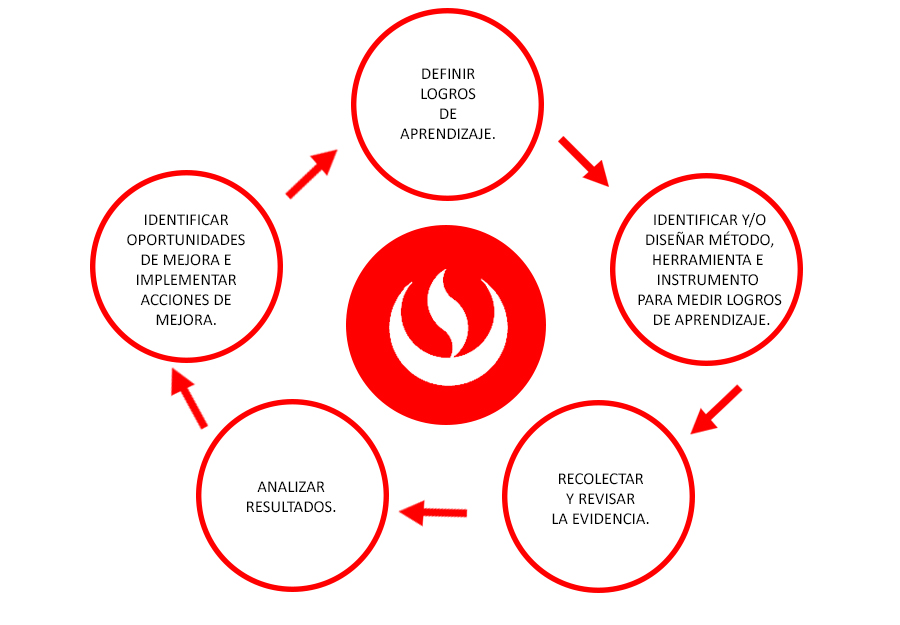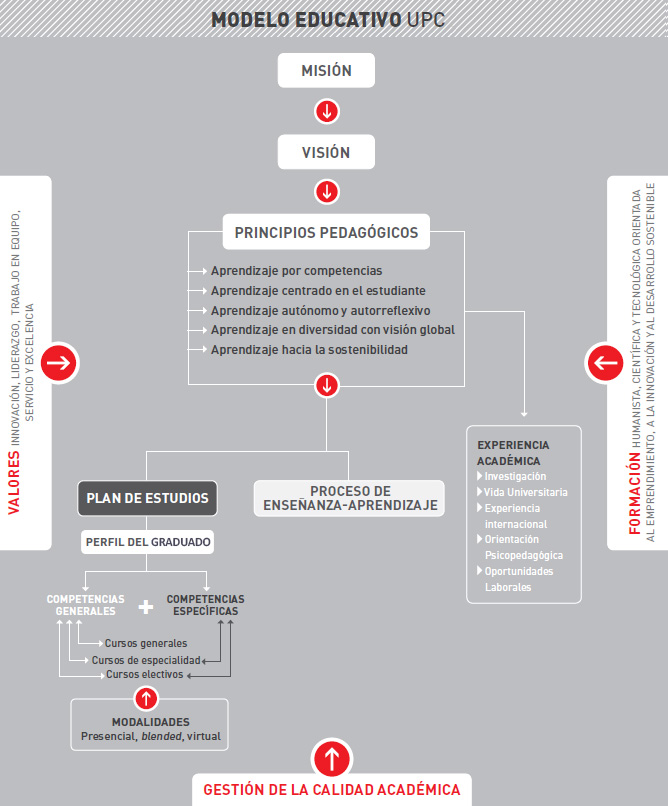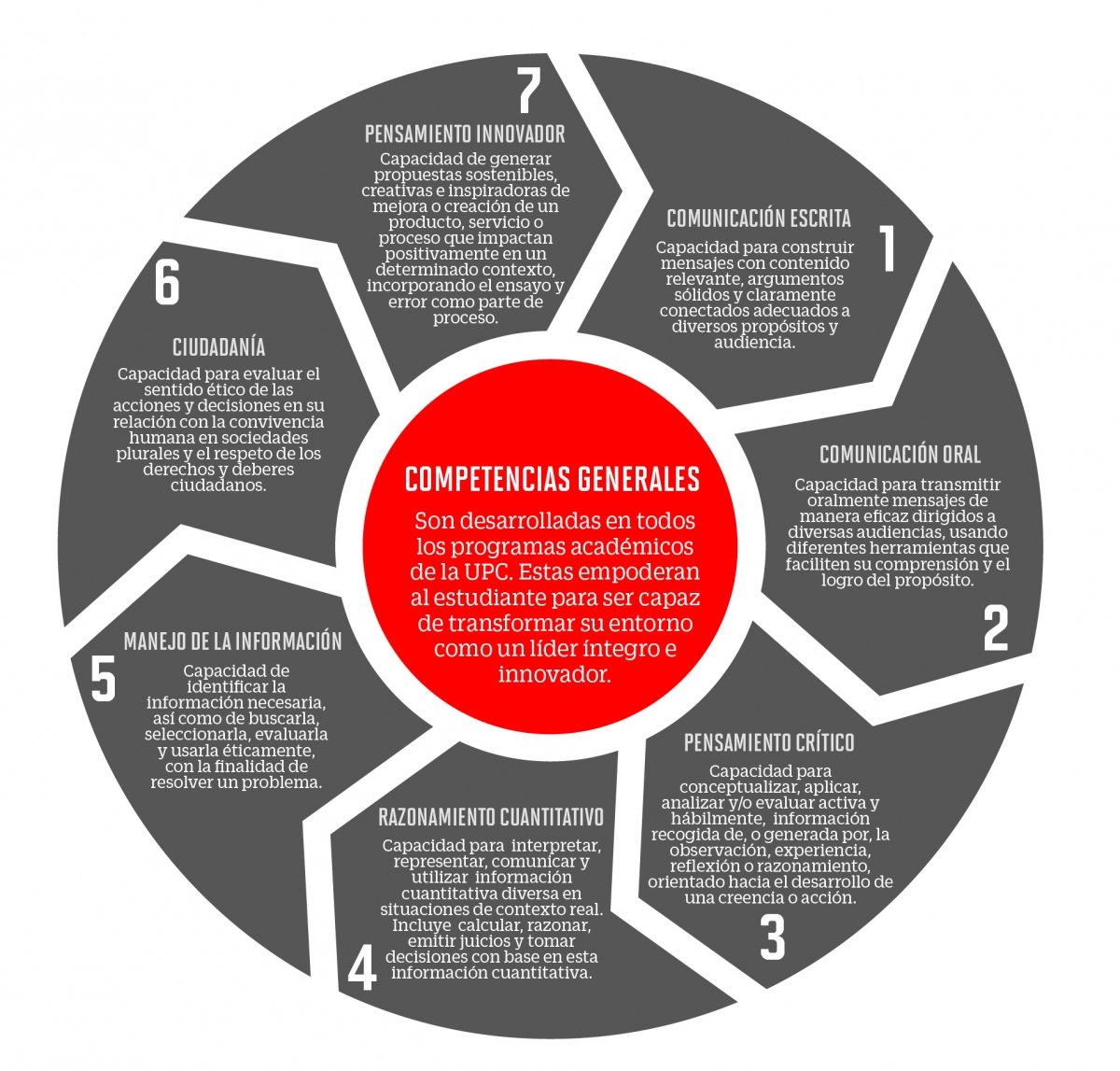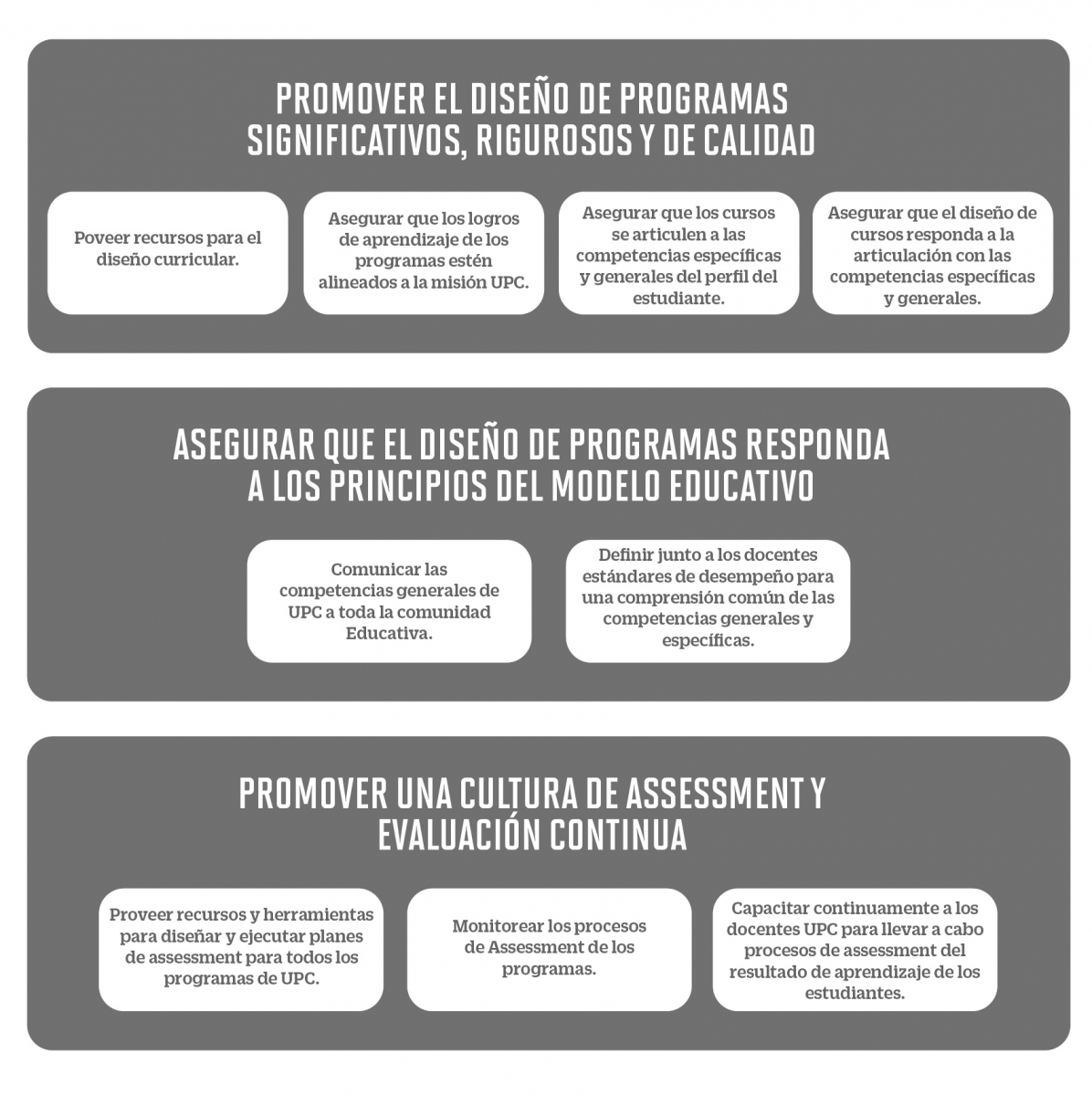Educational Model
UPC's educational model comprises a set of guidelines that summarize its academic philosophy and guide the educational process towards the graduate's personal and professional development, according to local and global demands. This model, which is expressed through the University’s essential functions –teaching and research–, is based on five pedagogic principles that support our educational processes and actions: competency-based learning, student-centered learning, autonomous and self-regulated learning, learning in diversity with a global vision, and learning towards sustainability.
Clic en la imagen para conocer el modelo educativo
PEDAGOGICAL PRINCIPLES
Competency-based LearningUPC has chosen a competency-based educational model; these competencies are aligned with social and labor market needs and expectations. These competencies make up the graduate student profile.
Student-centered LearningAt UPC, students are placed in the middle of the learning process, from where they actively participate, while the professor acts as a facilitator.
Independent and Self-regulated LearningThe University seeks to provide students with the tools required to achieve a certain purpose in learning, through self-regulation and the self-evaluation of their role and results in this process.
Learning in Diversity with a Global VisionOne of UPC's principles is the promotion of learning by recognizing, valuing and respecting diversity. It recognizes the essential value of internationalization and interculturality in the comprehensive education of its students.
Learning towards SustainabilityThe University is oriented towards the education of people and professionals capable of transforming their environment through innovative processes and means. In this way, it contributes to the country's sustainable development.
CURRICULUM
UPC’s academic programs are designed so that students, through a significant, coherent, rigorous and flexible curriculum, achieve the learning outcomes that contribute to the development of the professional competencies aligned with the necessities and demands of society and the local and global labor markets. These competencies make up the University's graduate student profile.
Graduate Student ProfileThe UPC graduate student profile consists of core competencies and specific competencies, which are developed throughout the curriculum. The courses and their organization allow students to reach the level defined in each competency progressively.
(Dar clic en la imagen para ampliar)
CURRICULAR DEVELOPMENT AND ASSESSMENT
The Curricular Development and Assessment area promotes the continuous evaluation of the processes that are involved in the students’ learning outcome. In that way, it assures high-quality, meaningful and rigorous academic programs.
In order to do this, this area works with three fundamental processes:
Clic en la imagen para ampliar
Assessment UPC
Since 2014, Universidad Peruana de Ciencias Aplicadas has an institutional assessment plan that defines guidelines and processes that allow measuring and assuring the development of the institutional learning outcomes and program learning outcomes by students.
This plan focuses not only on achieving that every program implements the process, but, above all, it seeks to build a continuous improvement culture at UPC that allows programs and areas to collect, review, and analyze information to identify improvement opportunities that are involved positively in student’s learning results.
In this way, Assessment UPC, as an institutional process, involves academic directors, faculty, students, and administrative staff. In other words, it involves the whole learning community at UPC, consolidating an assessment culture that contributes to guaranteeing the university's educational quality and continuous improvement of academic standards.

In order to move towards an assessment and solid learning culture, an institutional schedule for the first four years of the plan has been established. This allows to learn by doing, gain strength and leadership in the academic programs and improve the assessment processes.
In this way, the following institutional schedule has been established:
Undergraduate Assessment Schedule
| TERM | Institutional Learning Outcomes | Status |
|---|---|---|
| 2014-2 | Written Communication | Achieved |
| 2015-1 | Information Literacy | Achieved |
| 2015-1 | Quantitative Reasoning | Achieved |
| 2015-2 | Oral Communication | Achieved |
| 2016-2 | Critical Thinking | Achieved |
| 2016-2 | Citizenship | Achieved |
| 2017-2 | Innovative Thinking | Achieved |
| 2017-2 | Written Communication | Achieved |
| 2018-1 | Information Literacy | Under assessment |
| 2019-1 | Quantitative Reasoning | In process |
| 2019-2 | Oral Communication | - |
| TERM | Program Learning Outcomes | Status |
|---|---|---|
| 2015-2 | Program learning outcome #1 | Achieved |
| 2016-2 | Program learning outcome #2 | Achieved |
| 2017-2 | Program learning outcome #3 | Achieved |
| 2018-2 | Program learning outcome #4 | Achieved |
| 2019-2 | Program learning outcome #5 | In process |
Graduate Assessment Schedule
| TERM | Institutional Learning Outcomes | Status |
|---|---|---|
| 2015-2016 | Written Communication | Achieved |
| 2016-2017 | Information Literacy | Achieved |
| 2016-2017 | Quantitative Reasoning | Achieved |
| 2016-2017 | Oral Communication | Achieved |
| 2018 | Critical Thinking | Achieved |
| 2018 | Innovative Thinking | Achieved |
| 2019-2020 | Citizenship | In process |
| 2020-2021 | Written Communication | - |
| 2020-2021 | Information Literacy | - |
| TERM | Program Learning Outcomes | Status |
|---|---|---|
| 2016-2017 | Program learning outcome Global Vision | Achieved |
| 2018 | Program learning outcome Decision-making | Achieved |
| 2018 | Program learning outcome Managerial Leadership | Achieved |
| 2019 | Program learning outcome (of each program) | In process |
ASSESSMENT ACADEMY
The Assessment Academy is a learning community comprised by UPC faculty who are continuously and actively involved in the University's diverse assessment processes.
The first cohort of the Assessment Academy was formed in 2015, with 110 voluntary members from all the programs.
In 2016, the Assessment Academy consisted of 180 faculty members, 211 in 2017, and 168 in 2018.
The following goals are pursued in this learning environment:
Clic en la imagen para ampliar
-
To consolidate a student-centered assessment culture
Phase 1. Connect with the purpose and keep concepts aligned with the assessment, so that all the parties involved use the same language and recognize the significance of this process, in order to assure the continuous improvement on students' learning.
Phase 2. Develop, along with internal and external experts and through workshops, the abilities and knowledge required to carry out the process.
Phase 3. Acknowledge that assessment is everyone's responsibility and share personal learning with other community members, so that everyone is committed to the process.
-
To consolidate a learning community around assessment
In the Assessment Academy, each team's innovation potential is acknowledged, allowing them to generate new proposals and to improve the processes.
-
To have a team specialized in assessment
The Assessment Academy mainly looks for members with influence and leadership in their programs, who are able to take the initiative and to transfer the process know-how to all the educational community.
-
To promote the assessment process in all programs
The Assessment Academy members coordinate, supervise and train their teams, so that assessment is successfully performed.



